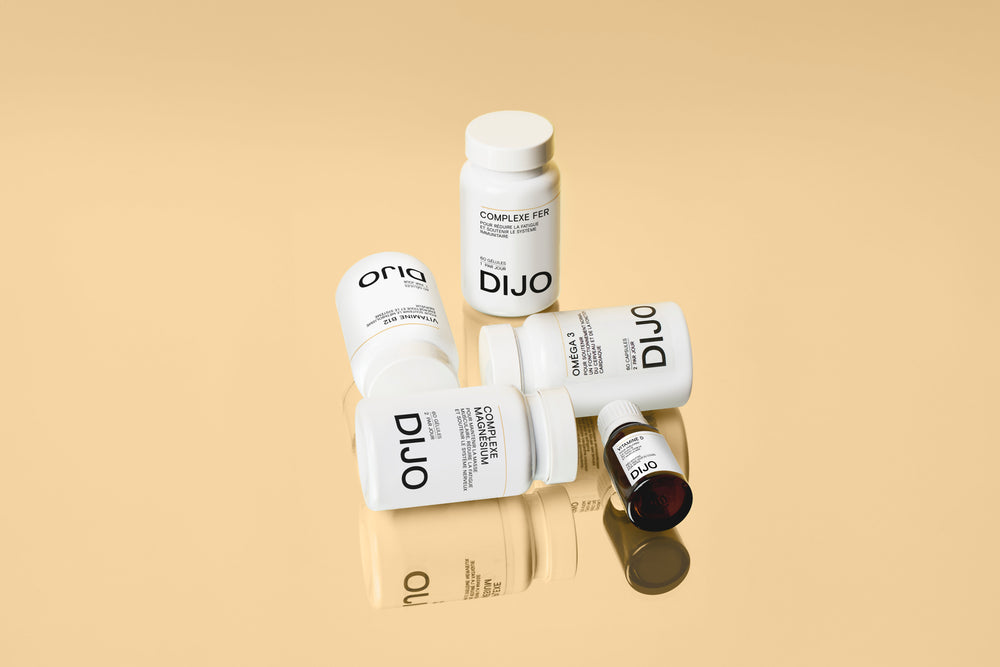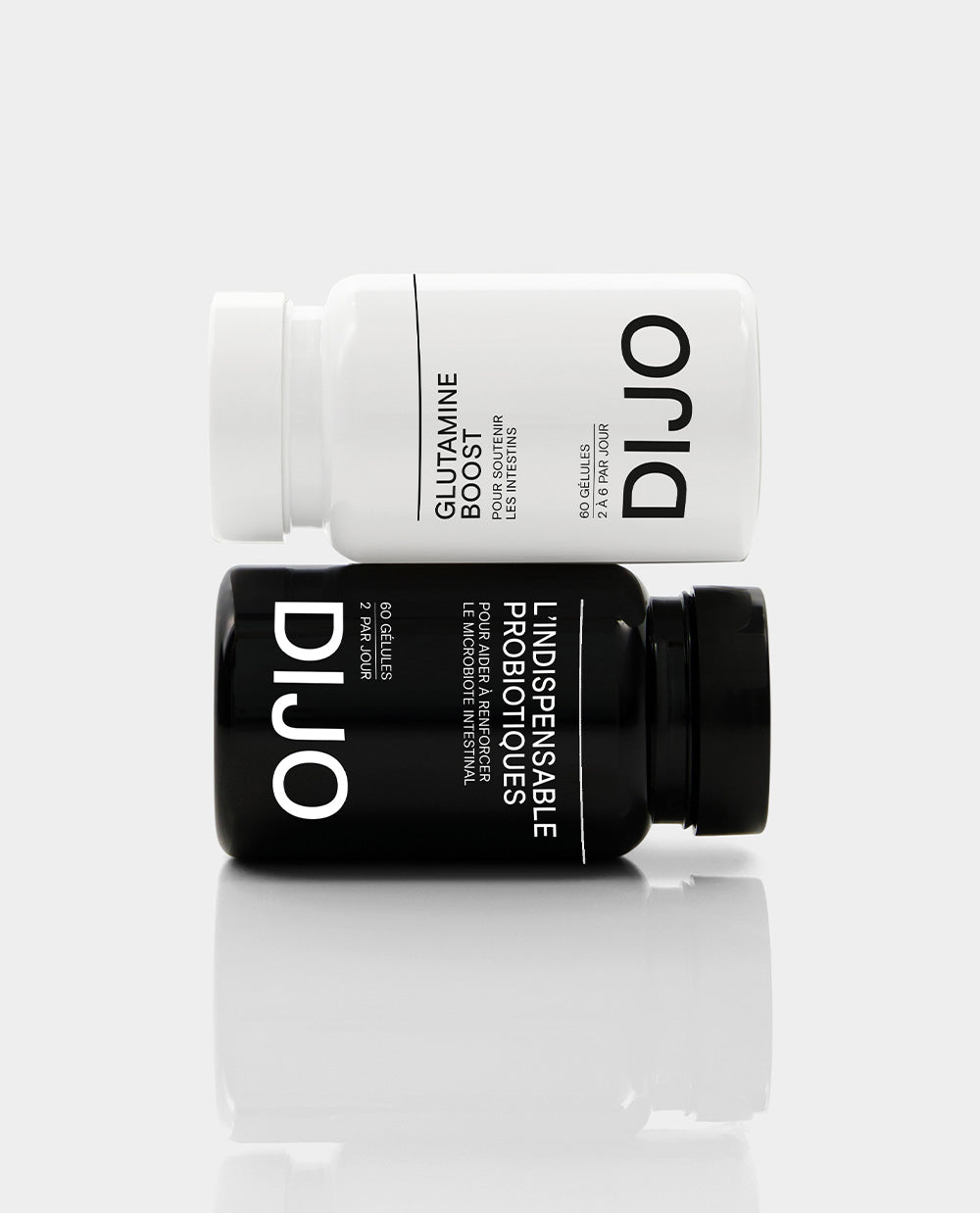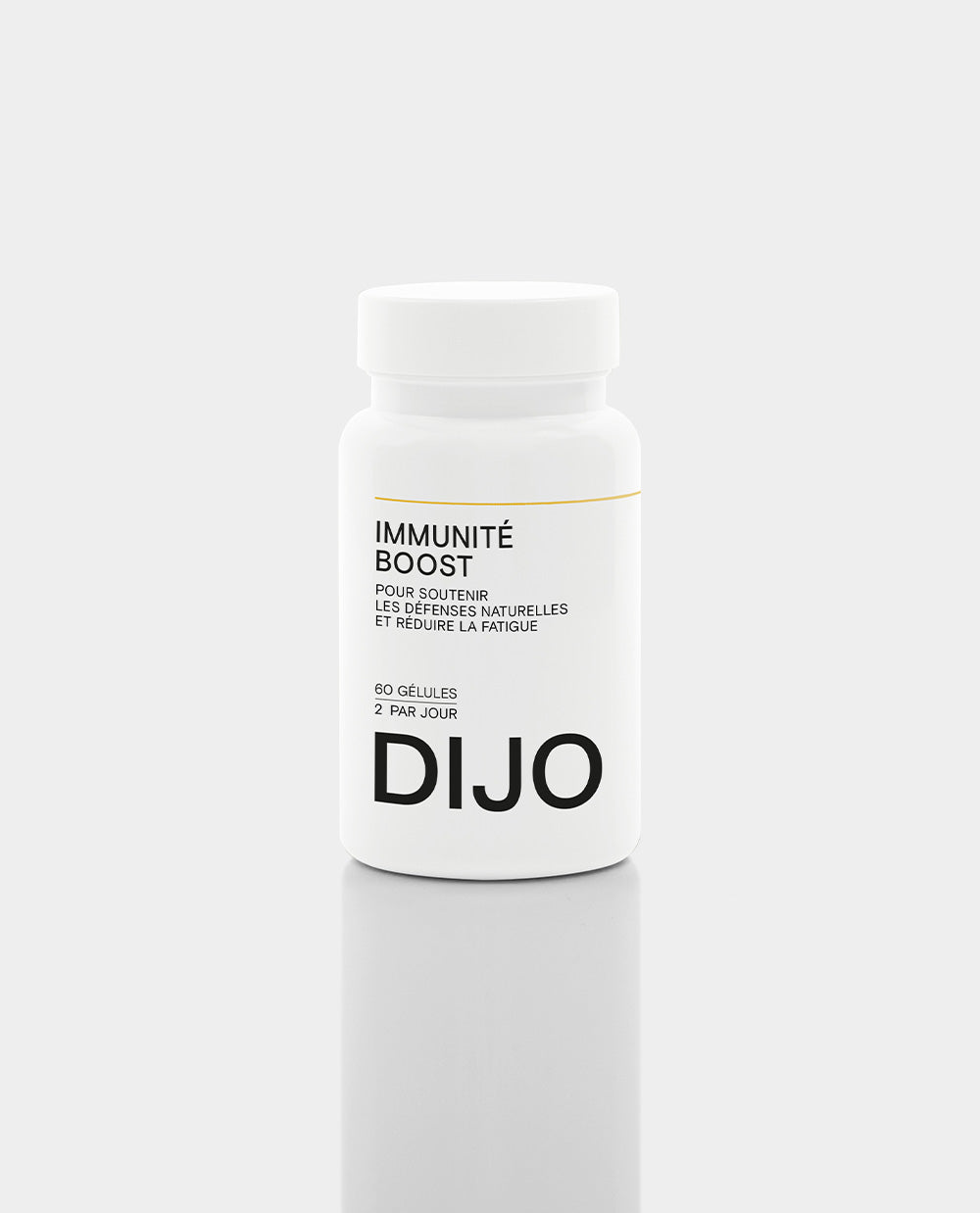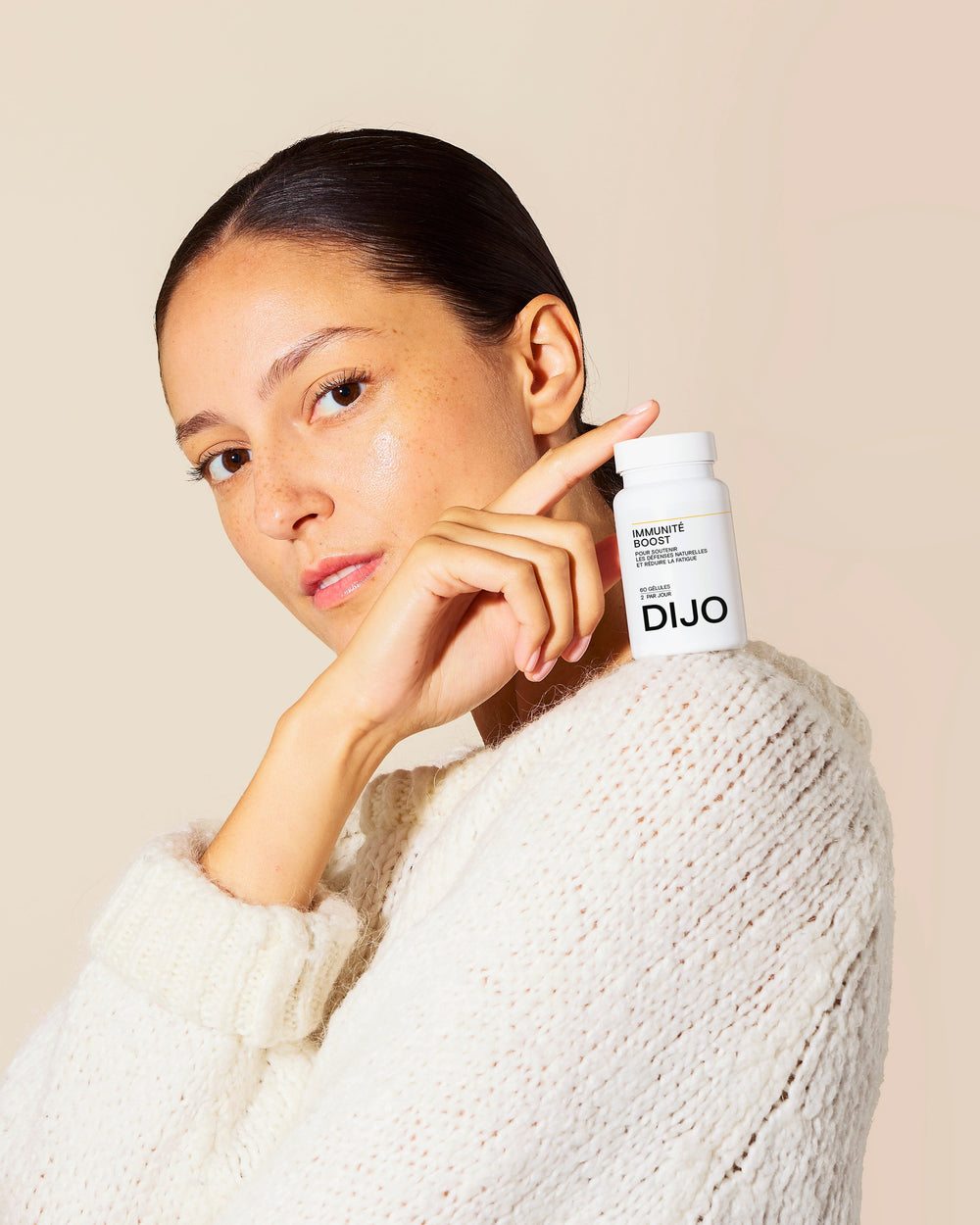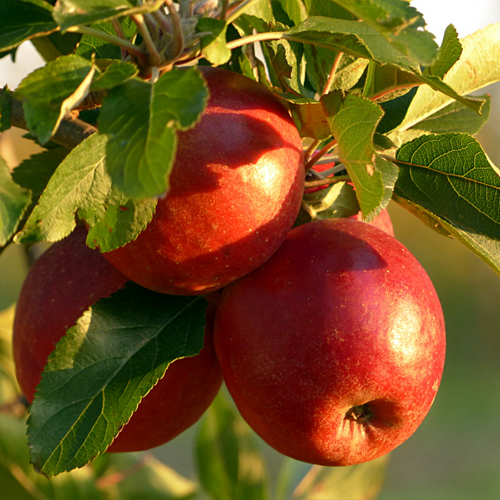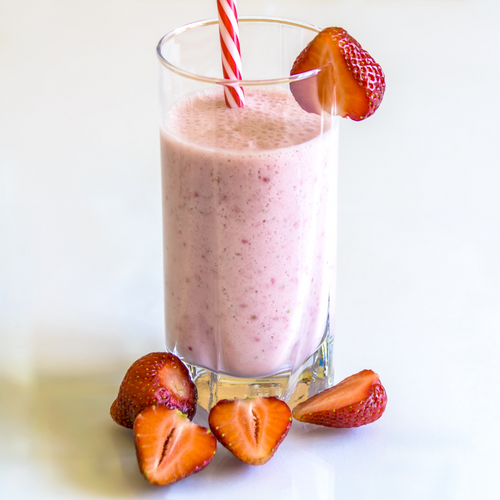What you need to remember :
- Vitamin D is fat-soluble and can therefore be assimilated by the body via fats.
- It is synthesized mainly by the skin thanks to the UVB rays of the sun and is provided in a minority by food.
- Supplementation is almost essential in winter due to low exposure to daylight.
- It is also essential for people at risk (infants, pregnant and breastfeeding women, elderly people, etc.).
- This vitamin contributes to bone, muscle, immune and nervous health, but also to the modulation of the intestinal microbiota and the regulation of certain hormones.
- It is found mainly in animal products.
What is vitamin D?
Vitamin D, also called calciferol, is one of the vitamins synthesized in part by the body. The body synthesizes 80-90% of it through the skin thanks to exposure to the sun and more particularly via UVB rays. The remaining 10-20% comes to us through food.
Heat, light and oxidation can alter it. It is therefore stable if stored away from light and in the absence of oxygen.
It is a so-called fat-soluble vitamin, meaning that it is soluble in fats. Consequently, it is assimilated by the body in the presence of the latter. In our body, it is stored in the liver, muscles and adipose tissue. It is thus released according to the needs of our cells.
However, excessive vitamin D stores, or hypervitaminosis D, can be dangerous and toxic to the body. This is why it is important not to supplement “blindly” because there may be no need.
What is vitamin D used for? Its different roles
Vitamin D is essential for the proper functioning of the body. Its main role is to maintain balanced phosphocalcic homeostasis. To do this, it increases the absorption capacity of calcium and phosphorus by the intestines.
A good blood calcium level ensures optimal mineralization of tissues (bones, cartilage and teeth), good muscle contraction, nerve transmission and blood coagulation. Vitamin D therefore intervenes in these processes indirectly.
It also plays a role in hormonal regulation (notably of thyroid hormones T3 and T4), the differentiation of cells of the immune system and the modulation of the intestinal microbiota (notably in cases of chronic inflammatory bowel diseases).
It also appears that this vitamin, when taken as a supplement, is involved in the weight loss process in people who are obese or overweight.
Risks of deficit?
A vitamin D deficiency reduces the absorption of calcium, which is essential for bone health, leading to demineralization (osteomalacia in adults, rickets in children), increasing the risk of fractures and muscle disorders (weakness, tetany). It also weakens the immune system, causes general fatigue and low morale.
People at risk include: infants, children, pregnant women, breastfeeding women, post-menopausal women, women with amenorrhea, elderly people, sun intolerant people, non-fish vegetarians, vegans, people after intestinal surgery or obesity, people with osteoporosis, night workers, indoor athletes, people from Nordic countries and dark skin (dark skin acts as a UVB filter). Before taking a vitamin D supplement, it is essential to measure the baseline level, especially from September-October when exposure to the sun decreases. Since vitamin D is mainly produced by the skin under the effect of the sun, winter supplementation is essential to avoid deficiency, despite daily dietary intake.
To overcome a vitamin D deficiency, it is necessary to take prescription ampoules. However, these are highly dosed and some of them are not absorbed by the body. This is why it will then be essential to continue supplementation (with drops for example) in order to maintain the restored levels. The best solution is in any case to have daily food intake as well as exposure to the sun as soon as possible in parallel with appropriate supplementation if necessary.
Sources of vitamin D
Vitamin D is found mainly in animal foods. Some plant foods also contain it to a lesser extent.
#1 - Cod liver oil
The food richest in vitamin D, with a content of 250 µg/100 g, or 25 µg per portion (= 1 tablespoon = 10g), it is taken as a supplement in the form of a capsule, gel cap or oil directly. However, having a pronounced taste and smell, encapsulated forms are more appreciated.
This oil is also very rich in vitamin A, vitamin E and omega-3 , lipids essential for the body, particularly for the nervous and cardiovascular systems.
#2 - Cod liver
It is the second richest food in vitamin D with a content of 100 µg/100 g (when raw). It can be found fresh or canned, where it will have a content of 54.3 µg of vitamin D per 100g.
Since vitamin D is a stored vitamin, eating one can of cod liver every week is more than enough to cover your needs, especially if your diet contains other sources of vitamin D.
#3 - Oily fish
The list of oily fish mainly includes salmon, trout, herring, sardines, mackerel and anchovies.
Here are the vitamin D contents of a serving of each fish:
Salmon: cooked: 8.7 µg/100 g - smoked: 5.5 µg/100 g
Trout: cooked: 15 µg/100 g - smoked: 5.2 µg/100 g
Herring: cooked: 11 µg/100 g - smoked: 22 µg/100 g
Sardine: raw: 14 µg/100 g - canned: between 7.5 and 12.5 µg/100 g
Mackerel: cooked: 7.7 µg/100 g - canned: between 2.4 and 7.3 µg/100 g
Anchovies: raw: 11 µg/100 g - salted: 4.6 µg/100 g
These fish are also very rich in omega-3.
It is recommended to consume 1 to 2 per week, favoring small oily fish (sardines, mackerel, herring, anchovies). Indeed, large fish such as salmon and trout are rich in heavy metals/pollutants (mercury, PCBs, dioxins). Since toxins attach themselves to fats, their consumption should be limited.
In concrete terms, a can of sardines or mackerel provides you with part of your daily needs.
#4 - Some lean fish
Some lean fish, such as gilthead bream, whiting, cod and tuna, have a good vitamin D content.
Here are the contents per 100g:
Royal sea bream: baked: 5.71 µg/100 g
Whiting: raw: 4.11 µg/100 g
Cod: salted, boiled: 1.25 µg/100 g
Tuna: raw: 7.8 µg/100 g - canned: 5.08 µg/100 g
It is recommended to eat 1 to 2 lean fish per week. However, sea bream and tuna should be limited due to their high toxin content (heavy metals/pollutants).
#5 - Certain mushrooms (chanterelles, porcini mushrooms, morels)
The only plant-based food sources that contain vitamin D are chanterelles (5.3 µg of vitamin D per 100 g), porcini mushrooms (3.1 µg/100 g) and morels (5.1 µg/100 g).
Consuming 100g of these 3 types of mushrooms regularly, in addition to the other sources mentioned here, allows you to easily meet your needs.
#6 - Offal (especially liver)
Calf's liver, with a content of 2.52 µg of vitamin D per 100 g, is interesting to consume from time to time to benefit from this vitamin but also from the iron it contains. It is also often recommended in cases of iron deficiency.
#7 - Egg yolk
Considered the perfect food from a protein point of view, the egg also contains quality fatty acids associated with a significant vitamin D content. Indeed, there are 2 µg of vitamin D per 100 g. Consuming 2 eggs (about 50 g) daily, fried, soft-boiled or soft-boiled, provides a supplement to daily needs.
#8 - Dairy products
Milk, yogurts, as well as cheeses and cottage cheeses, are well known for their calcium content. However, they also contain significant amounts of vitamin D. Consumed regularly as part of a balanced diet, they help cover needs.
Boost your immune system with DIJO food supplements
At DIJO, we have developed a vitamin D in drops suitable for an adult population. In combination with the Concrete Intestine Pack and Immunity Boost , it will be useful in winter in particular, to support bone health, immunity and many other processes as seen previously.
Sources :
[1] Anses, 02/03/2022, Vitamin D: why and how to ensure sufficient intake?, consulted from: https://www.anses.fr/fr/content/vitamine-d-pourquoi-et-comment-assurer-un-apport-suffisant
[2] Battistini, C., Ballan, R., Herkenhoff, M.E., Saad, S.M.I., & Sun, J. (2020). Vitamin D modulates gut microbiota in inflammatory bowel disease. International Journal of Molecular Sciences, 22(1), 362. https://doi.org/10.3390/ijms22010362
[3] Khosravi, ZS, Kafeshani, M., Tavasoli, P., Zadeh, AH, & Entezari, MH (2018). Effect of Vitamin D Supplementation on Weight Loss, Glycemic Indices, and Lipid Profile in Obese and Overweight Women: A Clinical Trial Study. International journal of preventive medicine, 9, 63. https://doi.org/10.4103/ijpvm.IJPVM_329_15













